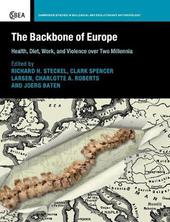
|
The Backbone of Europe: Health, Diet, Work and Violence over Two Millennia
Hardback
Main Details
Description
Using human skeletal remains, this volume traces health, workload and violence in the European population over the past 2,000 years. Health was surprisingly good for people who lived during the early Medieval Period. The Plague of Justinian of the sixth century was ultimately beneficial for health because the smaller population had relatively more resources that contributed to better living conditions. Increasing population density and inequality in the following centuries imposed an unhealthy diet - poor in protein - on the European population. With the onset of the Little Ice Age in the late Middle Ages, a further health decline ensued, which was not reversed until the nineteenth century. While some aspects of health declined, other attributes improved. During the early modern period, interpersonal violence (outside of warfare) declined possibly because stronger states and institutions were able to enforce compromise and cooperation. European health over the past two millennia was hence multifaceted in nature.
Author Biography
Richard H. Steckel is Distinguished University Professor Emeritus at the Ohio State University. He is a pioneer in blending human biology, anthropometrics, and measures from skeletal remains for insights into health and well-being. He has published over 120 articles, including two books with Cambridge. Clark Spencer Larsen is Distinguished University Professor in the Department of Anthropology at the Ohio State University, and member of the National Academy of Sciences. His research focuses on the last 10,000 years of human evolution, with particular emphasis on the history of health and lifestyle. He is the author of Bioarchaeology: Interpreting Behavior from the Human Skeleton (Cambridge, 2nd edition, 2015). Charlotte A. Roberts is a Professor of Archaeology at the University of Durham. She has studied and interpreted human remains from archaeological sites for the past thirty years. She is specifically interested in exploring the interaction of people with their environments in the past through patterns of health and disease, taking a multidisciplinary and multi-method approach. Joerg Baten is a Professor of Economic History at Eberhard-Karls-Universitat Tubingen, Germany, and Editor-in-Chief of Economics and Human Biology. His research focuses on the effects of nutrition, disease and violence on human development. He has authored or co-edited seven books, including A History of the Global Economy (Cambridge, 2016), an easily comprehensible overview on economic history of all world regions in the last 500 years.
Reviews'Over the last half-century there have been only a handful of publications that have pushed the boundaries of bioarchaeology, and The Backbone of Europe is one. This is bioarchaeology at its finest. The analysis of 15,119 human remains made it possible for the authors to discern the subtle nuances of interplay between economics, social change, and health. The Backbone of Europe is the ultimate bioarchaeological synthesis.' Jerry Rose, University of Arkansas 'This is another impressive example of the rich harvest of a daring and highly innovative research strategy: to squeeze all information from the archaeological records of human skeletons. This time, Europe is the focus of attention. The large dataset and the advanced techniques lead to many new insights into the long-term development of health, stature, workload, and violence in the continent from Antiquity to the present, challenging established views that the 'rise of the West' was an almost continuous process of economic and sociopolitical development.' Jan Luiten van Zanden, Utrecht University, The Netherlands 'In this companion volume to the much-acclaimed one on the Western Hemisphere, the authors chronicle in amazing detail the longitudinal and cross-sectional patterns in the health of human populations in Europe from the beginning of time to the modern era based on the physical remains of our ancestors. The 500 pages read like an exciting detective novel with a myriad of surprises along the way, and not only about health but also about diet, lifestyle, and violence. One can trace elements of a Malthusian demographic system across the millennia, beginning with the relatively good health of the Early Medieval populations and with the usual suspects of population density, inequality, income, and climate being the contributing cyclical factors. This book is a delight to read and ponder over. The reader will appreciate the immense amount of effort that went into each one of the projects.' John Komlos, University of Munich, Germany '... foundational ... a starting point for researchers in bio-demography, anthropometrics, and economic history.' Scott Alan Carson, Journal of Economics and Political Economy
|